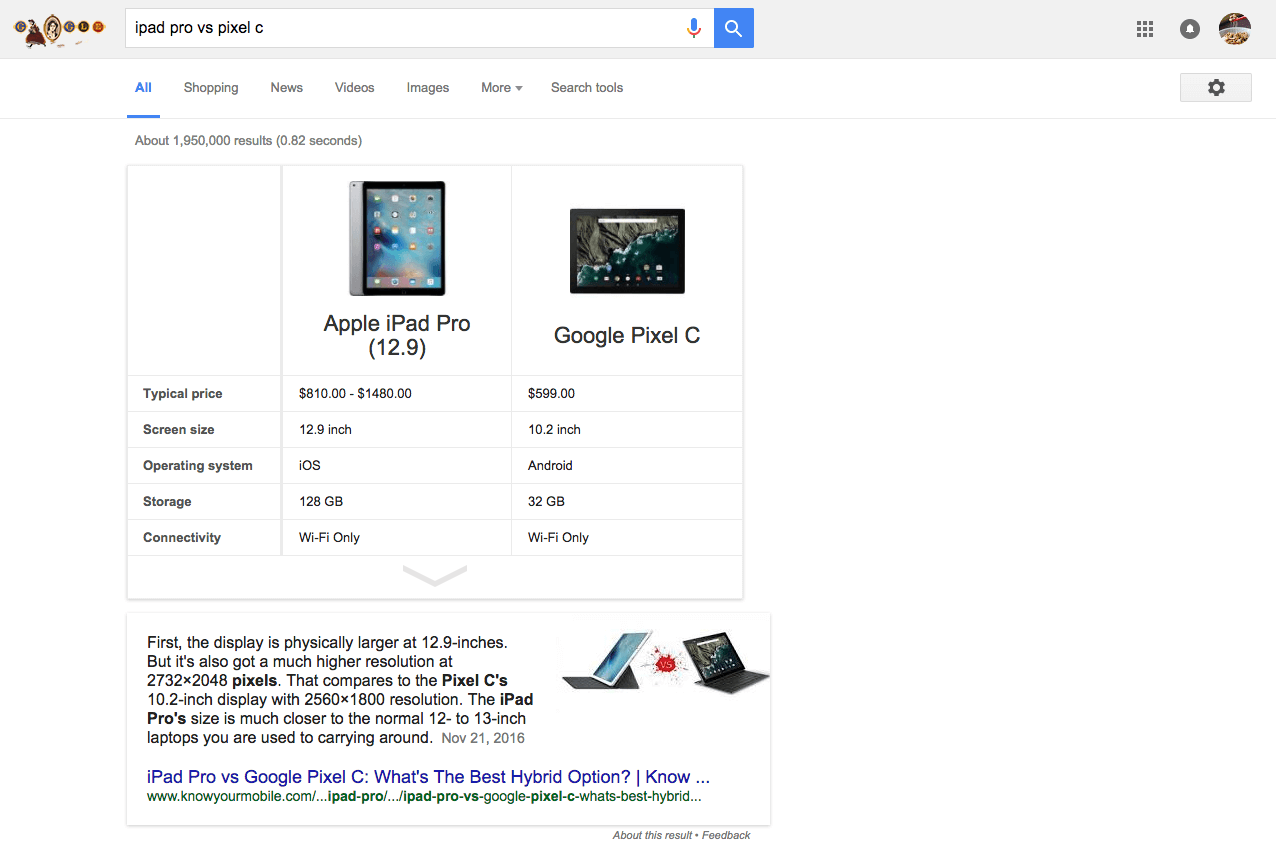It’s that time of year again; time to take stock of everything that’s happened in marketing since January.
Let’s start by looking at the big talking points in SEO, with the help of some our industry’s esteemed search experts.
Here’s what happened in 2016, and for more on this topic check out these resources from Econsultancy:
Site performance AMP
Felice Ayling, SEO and social director, Jellyfish:
The biggest buzz of 2016 was of course caused by the roll out of Google AMP, which promised to deliver faster page load speeds on mobile sites that were heavy on content.
While we’ve seen relatively slow adoption due to early issues around compatibility, those that have implemented AMP have seen improvements in their mobile performance including lower bounce rates, increased organic visibility and improved user experience.
AMP will no doubt continue to be a core theme for 2017 while more brands look to utilise this technology to improve their mobile experience.
Ruth Attwood, SEO consultant, 4Ps Marketing:
One thing I’ve noticed with quite a few clients this year is the (very welcome!) development of marketing teams starting to take a real interest in their site’s performance in terms of UX.
Site speed, especially, has far too often in the past been written off as “a problem for the IT/web guys†so I’m glad to start finally seeing some decline in this siloed thinking.
Google AMP
Personal assistants always-on searchÂ
Ruth Attwood, 4Ps:
The mainstream launches of the “home PA†systems like Amazon Alexa and Google home are going to get very interesting.
This idea of bringing search into an always-on state is a natural evolution of device proliferation but I’ll be watching very curiously to see how it starts to shake up user interaction with digital, especially buying patterns.
I’m waiting for Microsoft to show their hand in this arena too – thanks to Bing’s integration with Windows they’ve been moving more assertively into the “put the search capability where the users are already†methodology for longer, so that could get interesting.

Google ‘cards’ expansion of Schema
Andrew Girdwood, head of media technology, Signal:
The continued advancement of cards in search result pages was of great interest to me this year.
This is more than ‘just Knowledge Graph’ and includes the return of real-time Twitter cards, experimental Google+ and Local updates. This is an important trend as cards lead on to Google Now and Google Now becomes Google Home.
(Ed: Note that Google has recently started showing cards to compare products in search results, as the search engine gets better at understanding user queries.)
A related point is the expansion of Schema and its ability to influence search.
I spent more time this year helping plan website build projects that would produce as many SEO assets for a brand as possible and getting the Schema right was a reoccurring part of that.
Felice Ayling, Jellyfish:
While changes in paid ads have brought new challenges for brands, so the changes in organic results have brought greater opportunities.
Improvements to Google’s Knowledge Graph, increased visibility in search results pages through Schema markup and increased social indexation have all offered brands the opportunity to make their organic listings stand out and own the search landscape for brand terms.
Product comparison with Google cards. Screenshot via Venturebeat

Algorithmic changes mobile-first indexing
Andrew Girdwood, Signal:
I think Bing and Google both made nice algorithmic improvements this year. I’m generally happy with the quality of the search results.
Don’t get me wrong; as an SEO I can point to some howlers out there and there was a time when international English language results started to creep into Google.co.uk.
As a whole, though, I think Google’s direction towards mobile and other devices is the right thing to do.Â
Max Holloway, senior search manager, Pi Datametrics:
We’ve seen a couple of major algorithm updates this year with Possum and Penguin becoming part of the main algorithm (instead of a filter applied periodically).
Possum also indicates to us that the face of page one of Google is rapidly and continuously changing.
#1 on Google (when talking about traditional rankings) doesn’t mean the same thing now that it used to and we’re having to adapt our SEO strategies and ranking software to reflect that.
Glynn Davies, head of search strategy, Pi Datametrics:
The move towards mobile-first indexing in Google presents potential technical challenges for sites with substantially different mobile and desktop configurations.Â

Paid ad changes affect SEOÂ
Felice Ayling, Jellyfish:
Changes to the paid search landscape have impacted SEO this year.
Fewer sponsored links have led to greater competition for the available paid spots, leading to higher costs. As a result, we’ve seen an increased focus by brands on the top organic listings.
We’ve noticed a real shift in the type of work our clients are focusing on with a move away from keyword-focused optimisation towards a content and engagement strategy that delivers longer-term benefits.
Glynn Davies, Head of Search Strategy
AdWords has restricted availability of keyword data for non-advertisers. Will there be further restrictions on availability of data, and how will this impact planning and measurement for SEO?
SEO becomes big business
Max Holloway, Pi Datametrics:
SEO is continuing to gain credence among the broader business communities; in industries which have previously been very slow to adapt and adopt such as law, finance and logistics.
Huge companies are opening up their budgets to digital marketing in all forms and I genuinely think the SEO industry has never been in such a dominant position.
Along with the above, there are a number of companies (many which should know better) that are still taking huge risks with their websites.
Specifically in website migrations, we’ve seen far too many companies this year get a migration wrong and lose all of their visibility.
Large high street banks who would know the risks involved in, say, a database migration, and would pay upwards of £1,000,000 just for a consultation on that move, do not have the same caution and planning for a website migration.
Looking forward to next year I think we will have our work cut out as these hulking companies start to take SEO more seriously, in educating them and helping them in achieving brilliance online.
Tag Manager and Analytics improvements
Andrew Girdwood, Signal:
I think Google Tag Manager and Analytics have come on in leaps and bounds. It’s easier for SEOs to integrate their analytics with other marketing efforts and report across channels.
Tag Manager, in particular, matured significantly and is now much better at coping with multiple users.
SEO split testing
Will Critchlow, founder and CEO, Distilled:
For me, the highlight of anything we weren’t involved in was probably seeing more public announcements of agile tech companies split testing for SEO.
I believe that this kind of capability is the future of on-site SEO and it’s pretty exciting to see that validated in the marketplace by the bigger tech companies building the ability to test in this way into their own tech stacks.
We’re putting our money right where our mouths are on this trend – we launched our platform to paying customers this year (we announced it right at the back end of 2015) and it’ll end the year by passing 1bn requests served per month.
Article source: https://econsultancy.com/blog/68592-what-were-the-biggest-seo-trends-of-2016/
